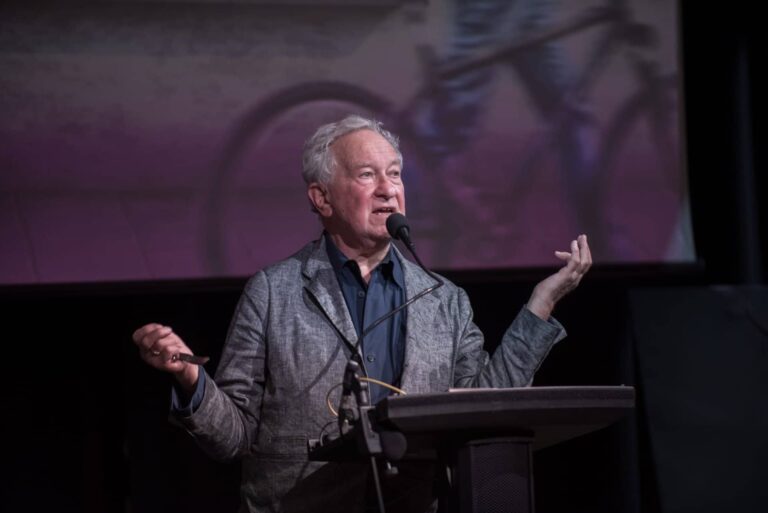By Lianne Kolirin
British historian Simon Shama has spoken about the “toxic” spread of anti-Semitism in popular culture since October 7, 2023.
He said that the rise of anti-Semitic hatred was “very upset” before the events of the day, but hatred was now spreading like “infection.”
Ir Simon described the “trivial and decay” of Holocaust memory by controversial public figures with enormous social media following.
He picked out the dishonorable rapper Ye, formerly known as Kanye West. And billionaire Elon Musk is Murun Musk for “two salutes in public.”
The statement was part of the keynote speech that Ir Simon gave at the Contemporary Anti-Semitism 2025 Conference held at the JW3 Centre this week. I came a few days before his latest film was screened, Simon Schama: The Road to AuschwitzIt will air on BBC2 on April 7th.
Despite writing extensively about Jewish history and the Holocaust, Ir Simon, born two weeks after Auschwitz’s liberation, had never visited the Nazi death camp before.
“This is when this horrifying blood transfusion into popular culture of this toxin, coupled with data from the Prevention League and claims meetings about being a younger generation, is most likely to be familiar with the Holocaust and most likely to dismiss its size.
The documentary sees Sir Simon travelling to Lithuanian mass murder sites, the home of his mother’s family, and Dutch mass murder sites famous for their long history of tolerance.
Speaking on JW3, he said he felt that Holocaust memories were “in a way, reduced to Anne Frank on the one hand and to Auschwitz on the other.” He explained this, saying he believes that Holocaust memories have become more appealing to a wider audience, except for the judiciary.
His film is an attempt to “revive the Jewish presence” and “resist the temptation to dilute, mitigate, universalize,” he said.
The three-day conference, held jointly by the London Centre for Contemporary Anti-Semitism Studies and the Anti-Semitism Studies Centre at Haifa University in Israel, brought in around 300 academics and 100 other participants in hopes of Brazil, Australia and India becoming their annual events.
Since the outbreak of the Israel-Gaza war, tensions have been rising on campuses around the world, both for students and staff. According to organizers, the conference aimed to provide a “safe space” for scholars to discuss and discuss modern anti-Semitism in all their guises.
Other keynote speakers included Jan Grabowski, a Polish and Canadian history professor at the University of Ottawa, who was threatened by the Polish government for writing about Polish collaboration in the Holocaust. Pamela Nadel, who joined the US Congress committee to fight anti-Semitism, also spoke at the meeting.
Participants listened to lectures on subjects ranging from anti-Semitism in gender studies to the role of AI and social media. The surge in anti-Semitism over the past 18 months has different characteristics in different parts of the world, but it has clearly been considered a global phenomenon.
It was particularly prominent in Monday’s session Boycott experience. It featured panelists from Britain, South Africa, Israel, Finland and the United States, who have been “boycotted” in attempts to stand up against anti-Semitism in the public sector since October 7th.
The debate chair said Professor Divish Anand, vice-president of Westminster University, was criticized for refusing to take part in efforts to boycott Israeli scholars.
He said he was neither a Jew nor an anti-Semitism expert, but he saw this cancel culture as an “attack on Jewish humanity” and as a democratic and liberal value system. He added: [on campus]. ”
The conference was deemed a “great success” by Professor David Hirsch, academic director and chief executive officer of the London Centre for Contemporary Anti-Semitic Studies, and Dr David Barak Gorodetsky, director of the Compare Centre.
“Anti-Semitist scholars, and scholars involved with anti-Semitism in their field, step outside the hostile environment they generally have to work and discuss research in a unique, open, supportive and rigorous scholarship community.”
“It has established itself as the annual Science Council on modern anti-Semitism subjects. It is a very important area for university health, our democracy and, above all, Jewish safety and well-being.”


